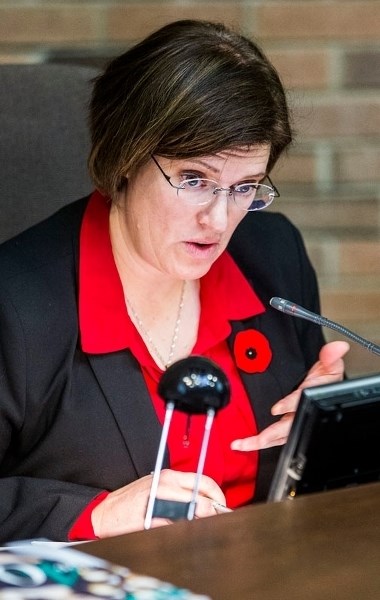This story is one of a series focusing on St. Albert council members' accomplishments and challenges and what their priorities are for the remaining year. In the three years since she was first elected to St.
This story is one of a series focusing on St. Albert council members' accomplishments and challenges and what their priorities are for the remaining year.
In the three years since she was first elected to St. Albert city council in 2013, Sheena Hughes says her main focus has been on the city's finances.
But in looking at what the council has as a whole accomplished, she said there are two things that stand out above the rest.
The first is the decision to part ways with former city manager Patrick Draper in May, and the October decision to hire incoming manager Kevin Scoble, who is expected to begin work in the new year.
“I've come to realize how important that one hire is to the entire direction, attitude, and that hire is ultimately very, very important,” Hughes said. “By doing that we've changed a lot of the potential focus moving forward.”
The second decision was to move forward with Project 9, a large trunk sewer line that will enable several new developments in the city, and specifically the decision with how to finance it.
Administration's initial proposal was to take on debt to fund the $40 million project, with an eye to recovering those costs through off-site levies the city collected on new developments.
In the end, council opted to fund $30 million through debt, and fund the remainder from reserves – a move she said reduced long-term risk to taxpayers.
While Hughes said she feels her influence helped to move that project towards a less-risky funding model, she noted many personal accomplishments that also had the goal of respecting the taxpayer.
For example, in looking closely at the numbers city staff present, and questioning them where appropriate, she said she feels she has provided considerable savings to taxpayers – something she's very proud of.
“I figure that between just the motions and the questions I've asked, I've reduced the taxes between half a per cent and one per cent every year,” she said.
Likewise, Hughes pointed to her efforts to keep utility rates down – including her efforts to convince other councillors of the need to include federal and provincial grant money in the utility budgets – as a point of pride.
“The affordability factor for me has been a really strong issue,” she said. “I want people to be able to afford to live here.”
Hughes also highlighted other efforts she has made with respect to fiscal restraint while also being able to improve or preserve quality of life for residents.
She has pushed things like more dog-waste pickup in parks and better maintenance on sidewalks and trails.
“It's not an exciting topic, but it's something people appreciate when they see the sidewalks and trails are being repaired at the right level,” she said.
Other accomplishments Hughes cites is proposed changes to the procedural bylaw that will give residents more time to offer input at public hearings, and changes to council policies to prevent councillors from taking jobs with the city.
There have been some notable challenges for this council, as well, and she pointed to some ideological differences as being at the top of the list. While she rejects the idea that this council is dysfunctional, she said she's sometimes frustrated by other councillors' seemingly ideological positions on some issues.
She said planning for possible LRT expansion is one example. In her mind, it will cause “ridiculous amounts of congestion” to run an LRT line up St. Albert Trail, with little to no benefit for transit ridership.
“That's been my challenge,” she said. “When I'm trying to present facts and say should we be looking again at this decision, and the majority of council wants to move forward and the facts I'm presenting don't seem to sway them.”
Hughes has also been frustrated with the Capital Region Board, which she said imposes policy on the city while council then has to figure out how to accommodate. The higher density targets approved this fall, for example, present a significant challenge for the community.
“Those people who are not part of our community are now making decisions about our community,” she said. “That is a huge challenge we're facing.”
Another big challenge she sees is the impending capital budget shortfall over the next decade – and it's one she said should be the top priority as this council finishes out its term.
“With a $310 million capital shortfall, we can't afford to build everything on that wish list,” Hughes said. “We have to figure out what are our wants, our needs, and how we can address them.”
The best solution, in her mind, is to “think outside the box” to maximize current facility use rather than spending large amounts on new facilities – the new branch library and proposed new swimming pool, for example.
Lastly, she said growth in city staff is something she would like to see addressed. She said while the population is growing about one per cent per year, staff growth is four times that. She hopes to bring a motion forward in the coming months to address this concern.
